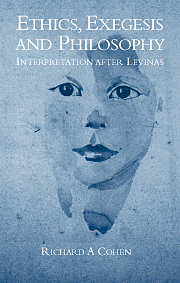Book contents
- Frontmatter
- Contents
- Introduction: philosophy as ethical exegesis
- PART I EXCEEDING PHENOMENOLOGY
- PART II GOOD AND EVIL
- 5 Alterity and alteration: development of an opus
- 6 Maternal body/maternal psyche: contra psychoanalytic philosophy
- 7 Humanism and the rights of exegesis
- 8 What good is the Holocaust? On suffering and evil
- 9 Ricoeur and the lure of self-esteem
- 10 In-conclusion
- Index
9 - Ricoeur and the lure of self-esteem
Published online by Cambridge University Press: 22 September 2009
- Frontmatter
- Contents
- Introduction: philosophy as ethical exegesis
- PART I EXCEEDING PHENOMENOLOGY
- PART II GOOD AND EVIL
- 5 Alterity and alteration: development of an opus
- 6 Maternal body/maternal psyche: contra psychoanalytic philosophy
- 7 Humanism and the rights of exegesis
- 8 What good is the Holocaust? On suffering and evil
- 9 Ricoeur and the lure of self-esteem
- 10 In-conclusion
- Index
Summary
I have much admiration, as you know, for Paul Ricoeur. In all of contemporary philosophy, he is a spirit of both audacity and perfect honesty. But there is a small disagreement between us regarding good relations with the other.
Emmanuel Levinas, interview, 1992INTRODUCTION
The pull of immanence is powerful. Given its title and subject matter, it is no surprise that Paul Ricoeur's recent work, Oneself as Another (Soi-même comme un autre), based on his 1986 Gifford Lectures, concludes with three discussions of the work of Emmanuel Levinas. No one more than Levinas has made the relation of self to other, as ethics, more central to philosophy. And now in Oneself as Another Ricoeur, too, wants to highlight the ethical character of selfhood and its intimate relation to the alterity of other persons. That the confrontation with Levinas strikes close to Ricoeur's efforts is underscored by the fact that his confrontation with Levinas appears at the two culminating moments of Oneself as Another: at the beginning (chapter seven) and at the end (chapter ten) of its fourth and concluding part on the moral and ontological character of the self. Furthermore, since its last chapter, chapter ten, was developed two years after the rest of the work, for the Cericy Decade of 1988, it represents not only two more years of reflection on all the themes presented in 1986, but especially, as the text bears out, two more years of reflection on the criticisms of Levinas initiated in chapter seven.
- Type
- Chapter
- Information
- Ethics, Exegesis and PhilosophyInterpretation after Levinas, pp. 283 - 325Publisher: Cambridge University PressPrint publication year: 2001



